A tale to read and play with children.
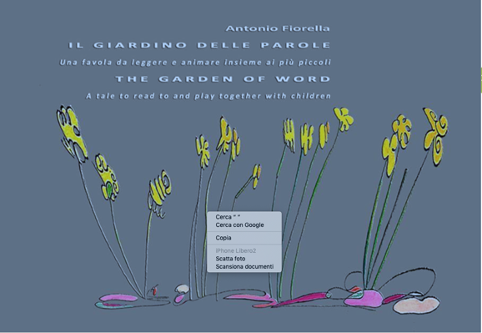
Nel paese delle nebbie, all’inizio della primavera, ogni tanto specie dopo una giornata ventosa spuntava un giorno radioso.
In the country of fog, at the beginning of spring, sometimes especially after a windy day there would be a bright cloudless day.
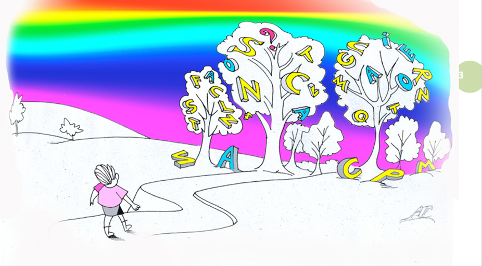
In quel giorno radioso lungo un canale, un bimbo, tutto solo, se ne andava a zonzo. Non sapeva dove si trovava, né dove andava, né da dove veniva. Non conosceva il suo nome e neanche quello dei suoi genitori che d’altronde non aveva mai visto. Era un orfanello che dei nomi o delle parole aveva solo idee confuse. Mai avrebbe immaginato quanto per lui quel giorno sarebbe stato speciale.
In that bright cloudless day, along a stream, a child was wandering alone. He did not know where he was, or where he was going, nor where he was coming from. He did not know his own name or that of his parents whom he had never seen anyway. He was a little orphan who had confused ideas about names and words. He would never have imagined how special that day would be for him.
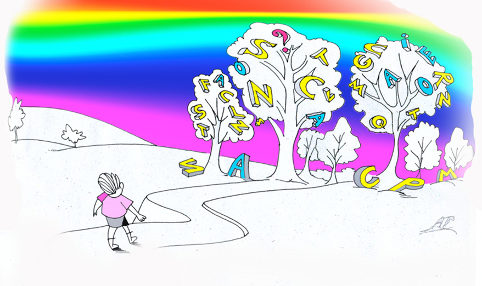
Infatti quando raggiunse un parco con tante piante altissime, e poco dopo un giardino con tanti colori, pensò che si trattasse di un giardino fiorito. Solo quando si avvicinò si accorse che quei fiori erano diversi da quanto aveva mai visto sino ad allora.
In fact when he reached a park with a lot of tall trees, and a little later a garden full of colours, he thought that it was a garden full of flowers. Only when he went closer he became aware that those flowers were different from those he had ever seen before.
Al posto dei fiori, c’erano parole di tutte le dimensioni e dai colori vivaci. Ce n’erano di piccole piccole e nere come formichine. E grandi e quadrate quanto scatole, rosse e blu. Ce n’erano di gialle bordate di viola, alcune alte e a strisce verdi e bianche. Poi ce n’erano di tanti colori tutti messi insieme…. (farsi suggerire i colori) azzurre, rosa, arancione… E di tutte le forme….(farsi suggerire le forme) rotonde, quadrate… Ed erano leggerissime come coriandoli. Tanto leggere che anche un bimbo poteva sollevarle e farle volare.
Al piccolo orfano venne un’idea. Volle prenderne con sé alcune da mettere in un sacchetto. Non sapeva cosa ne avrebbe fatto, ma il fatto che fossero belle da vedere e leggere da trasportare, era già un motivo sufficiente per invogliarlo a prenderne con sé una grossa quantità.
Instead of flowers there were words, made of variety of shapes and lively colours. There were tiny words, small and black like little ants. And others, as big and square as boxes, red and blue (boxes). Others were yellow with violet borders, some tall with white and green stripes. Then there were many with mixed colours… (let children prompt colours) blue, pink, orange… And of variety of shapes… (let children prompt shapes) round, square… And they were very light like confetti. They were so light that even a child could lift them and make them fly.
A thought came to the little orphan. He wanted to take some of them, to carry in a small bag. He did not know what he was going to do with them, but the fact, that they were nice to see and light to take away, was already reason enough to tempt him to take with him a large quantity.
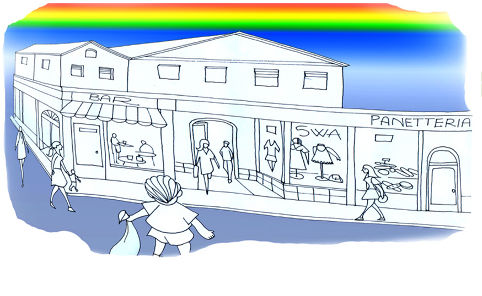
Ricco di un sacco di parole dai colori sgargianti, gonfio come quello dei grandi, si rimise in moto. E strada facendo raggiunse prima alcune case sparpagliate, poi una serie di negozi sotto i portici. Era in un centro abitato.
Soon the little bag swelled so much to become a bag full of words, as big as those of grownups. He started moving again, with a big bag full of words, with gaudy colours. On his way he first reached a few scattered houses, then a row of shops under the arches. It was a small town
Dopo tanto cammino, cominciava a sentire un po’ fame. Si fermò a guardare una vetrina dove era esposta ogni forma di pane…. (farsi suggerire le forme) e anche una certa varietà di dolciumi. Entrò e attese.
After a long walk, he stared to feel hungry. He stopped to look at a shop window where many kinds of bread were shown (let children prompt shapes) and also a variety of cakes.
C’erano alcune persone che chiedevano, pagavano e ricevevano del pane o altro in sacchetti bianchi. Arrivò il suo turno e chiese, o meglio indicò col dito indice che voleva un panino tutto rotondo e forse anche una tortina di mele. E quando la signora domandò se fosse solo o se avesse del denaro per pagare, il bimbo aprì il sacco che teneva in una mano, con l’altra offrì una manciata di paroline… e attese.
There were people who asked for, paid, and got bread or something else in white bags. When it was his turn he asked for (namely he pointed with his finger at) a round piece of bread and perhaps an apple pie too. And when the lady shopkeeper inquired if he was alone or if he had money to pay, the child opened the bag he held with one hand and with the other hand he offered a handful of words… and waited.

La signora guardò le parole, incuriosita le mise in ordine e, sorrise con un largo sorriso. Quindi diede il panino e la tortina di mele all’orfanello che anche lui tutto sorridente se ne andò.
The lady looked at the words, curiously she put them in order, and smiled with a large smile. Hence she gave the piece of bread and the apple cake to the little orphan, who went away smilingly too.
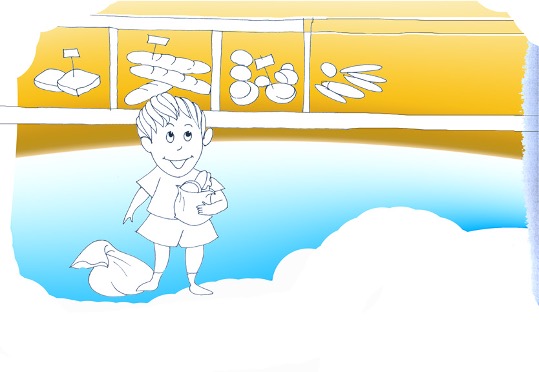
Il bimbo guardò nel sacco soddisfatto. Che fortuna aver fatto scorta di tante parole! Pensò subito di approfittarne di nuovo.
Passò davanti a un negozio di giocattoli. Appena entrato afferrò un aeroplanino, una macchinina e una palla… ed era ancora indeciso se prendere o non prendere altri giocattoli, quando si avvicinò il padrone.
The child looked in the bag satisfactorily. Luckily he had a provision of a lot of words! He thought he would soon take advantage of it again.
He went past a toy shop. As soon as he entered into the shop he took a small airplane, a tiny car and a ball… and he was still undecided if to take or not other toys, when the shopkeeper came over.
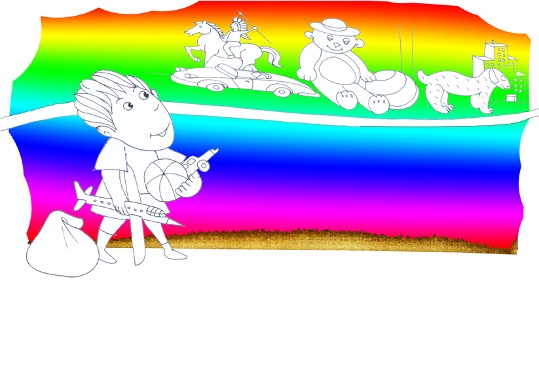
Questi gli tolse dalle mani i giocattoli, e quando chiese senza mezzi termini se avesse il denaro per comprarli, il bimbo per tutta risposta gli porse una manciata di paroline…
L’uomo guardò le parole… Una in particolare lo colpì, lo mandò su tutte le furie, e visibilmente arrabbiato cacciò il bimbo fuori del negozio, minacciandolo di non farsi più vedere.
The man took the toys from the child’s hands, and when he asked abruptly if the child had the money to buy them, the child gave him a handful of words in response…
The man looked at the words… One in particular struck him and made him very angry indeed! And he pushed the little orphan out of his shop, threatening him not to show up again.
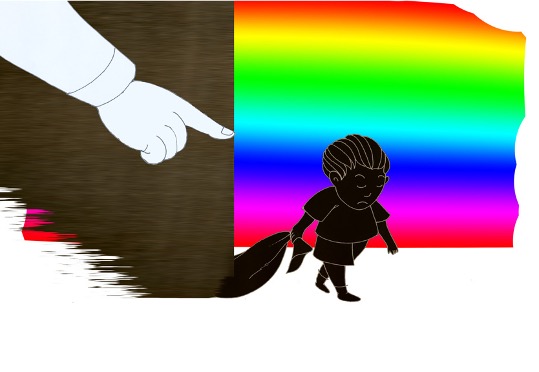
Allora l’orfanello si mise di nuovo in cammino, un po’ incerto ma tuttavia deciso a ritentare la sorte. Aveva imparato da solo a camminare, aveva sempre fatto tutto da solo, capiva che non poteva arrendersi alla prima sconfitta.
Quando di lì a poco passò davanti a un bar, si rammentò di avere sete ed entrò. Chiese da bere e, senza attendere, mise sul banco una manciata di paroline…
So the child went on, a little uncertain but still determined to have another try. He had learnt to walk all by himself, he understood he could not give up at the first obstacle.
After a while he arrived at a café, he realised he was thirsty and went in. He asked for a drink, and without waiting, he put on the counter a handful of words…
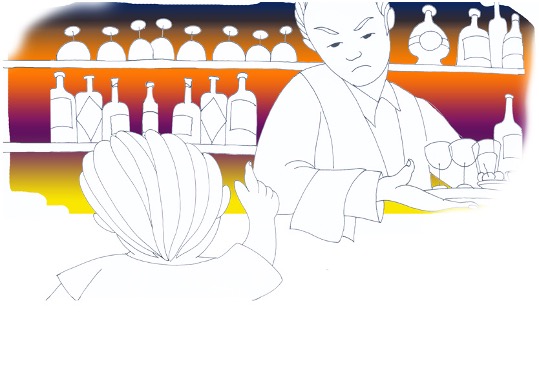
Il barista non si lasciò incantare dai bei colori delle parole. Non gli prestò molta attenzione, sembrava molto occupato. Poi quando si fermò a leggere, borbottò che dopotutto era anche un bambino maleducato. E continuò a servire gli altri clienti.
The barman did not let himself be deceived by the nice coloured words. He did not pay them too much attention, he was rather busy. Later on, when he stopped reading, he muttered that after all he was a bad mannered child. And he continued to serve other customers.
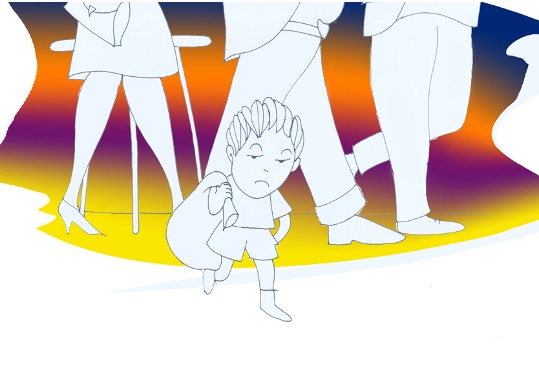
Adesso il piccolo orfano era davvero sconcertato. Certo di avere con sé una piccola fortuna, non sapeva come usarla. Forse per la sete, forse per la delusione, si mise a piangere.
Un vecchio che aveva seguito tutta la scena gli diede lui un bicchiere di acqua. Poi invitò il bimbo a seguirlo fuori del bar. Seduti su una panchina, il vecchio spiegò al bambino che le parole non sono tutte uguali. A parte i colori e le forme, esse possono essere belle o brutte. A seconda di come vengono messe le une dietro le altre, a seconda di come si pronunciano, esse possono diventare ancora più belle o talmente brutte che possono fare molto male: bisogna fare molta attenzione con le parole.
Now the little orphan was really disconcerted. He was sure he had with him a small fortune, but he did not know how to use it. Perhaps because he was thirsty, perhaps because he was disappointed, he started to cry.
An old man who had seen what had happened gave him a glass of water. Then he invited the child to follow him outside the café. Sat on a bench, he explained to the child that words are not all the same. Apart from colours and shapes, they can be good or bad. Depending on how they are put together one after another, they can become even nicer or worse, up to a point that they can sound dangerous: everyone has to pay a lot of attention to words.
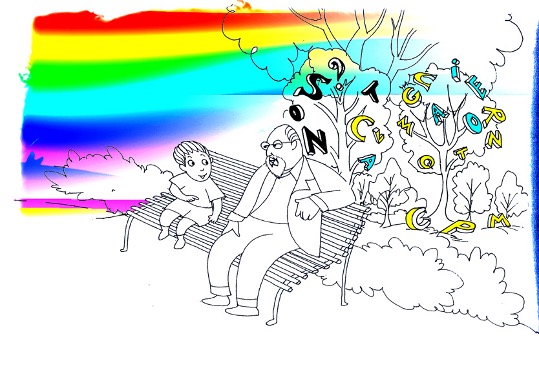
Intrusione delle neuroscienze nella sfera della moralità
Il bambino ascoltava interessato senza perdere di vista il suo sacco come se si trattasse di un tesoro.
Allora il vecchio l’interrogò se voleva andare in un posto, assieme ad altri bambini, dove s’impara a conoscere e a bene usare le parole. Naturalmente il bimbo fece di sì con la testa. Quindi insieme s’incamminarono verso una vecchia scuola di campagna.
“Benvenuto!” disse il vecchio nel varcare la soglia della scuola “da qui comincia il viaggio alla scoperta del mondo delle parole”.
“Bentrovato” rispose il bimbo, e non seppe aggiungere altro.
The child was listening interested, keeping an eye on his bag as if it was a treasure. Then the old man asked him if he wanted to go to a place, together with other children, where one can learn to read and to use words correctly. Naturally the child nodded yes. So the two of them went along towards an old school in the countryside.
“Welcome Benjamin!” (*) said the old man crossing the threshold of the school “here starts your journey into the discovery of the world of words.”
“Well… Ben” answered the child, and he did not know what to say next.
(*) Benvenuto = welcome, one of the names given to foundling children.
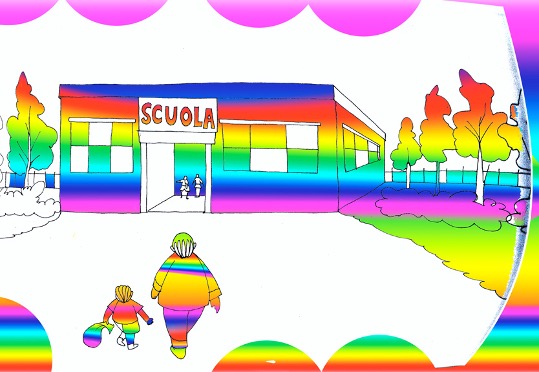
Il gioco de Il giardino delle parole
Idealmente ci sono 3 ruoli: quello del negoziante, dell’addetto alla custodia dei bigliettini con le parole, uno o più bambini. 3 colonne da completare/da colorare (o già colorate) ciascuna colonna con un colore diverso, da ritagliare i rettangolini e metterli in 3 recipienti contrassegnati dagli stessi colori. Quindi l’addetto alla custodia dei bigliettini, dopo averli mischiati, porge al bambino o alla bambina i recipienti, per pescare un bigliettino di ciascun colore. Il bambino o la bambina porgeranno, come se si trattasse di denaro contante, i bigliettini al negoziante, il quale a seconda del significato dell’insieme delle parole, assumerà un atteggiamento adeguato, di contentezza, di rabbia, di sorpresa …
“da qui comincia il viaggio alla scoperta del mondo delle parole”
The game ‘The garden of words’
Ideally there are 3 different roles: one is the role of the shopkeeper, another looks after the ‘pieces of paper with words’ and one child or several children.
There are ‘3 lists/columns’ completed with words, consistent with the objects that are available for the game, and to be coloured. Each rectangle will be cut and put in 3 different recipients with the same colour.
The person in charge of the recipients will ask the child to take one rectangle from each recipient.
The child will offer them as money in exchange for the object he wants to buy.
The shopkeeper, depending on the written phrase, will make faces showing to be happy or angry or surprised…
“here starts your journey into the discovery of the world of words”1
1. L’appellativo con cui ci si rivolge al padrone (o negoziante)
Bella signora
uomo
vecchio
brutto ceffo
strega
mamma
papà
signore
Words to be addressed to the shopkeeper
Nice lady
Man
old man
ugly scoundrel
you witch
mummy
daddy
sir
miss
2. La richiesta
Per favore mi dai
mi presti
dammi
per favore posso prendere
portami
quanto costa
buttalo via
voglio comprare
The required action
please give me
can I borrow
give it to me now
please may I have
bring me
how much is it
throw it away
I want to buy
3. Gli oggetti in vendita
una bambola
una caramella
un libro
una moneta
un biscotto
una matita
un panino
una tortina di mele
un aeroplanino
una macchinina
una palla
The objects on sale
a doll
a small car
a toffee
a book
a coin
a biscuit
a pencil
a piece of bread
an apple pie (apple cake)
a small airplane,
a tiny car
a ball

